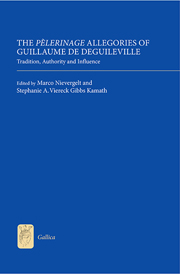Book contents
- Frontmatter
- Contents
- List of Illustrations
- List of Contributors
- Acknowledgements
- Abbreviations
- Introduction
- Part I Tradition
- Part II Authority
- 4 Les écrits pérégrins ou les voies de l'autorité chez Guillaume de Deguileville: Le modèle épistolaire et juridique
- 5 ‘Ce mauvais tabellion’: Satanic and Marian Textuality in Deguileville's Pèlerinage de l'Âme
- 6 Making Sense of Deguileville's Autobiographical Project: The Evidence of Paris, Bibliothèque nationale de France MS Latin 14845
- Part III Influence
- Bibliography
- Index
4 - Les écrits pérégrins ou les voies de l'autorité chez Guillaume de Deguileville: Le modèle épistolaire et juridique
from Part II - Authority
Published online by Cambridge University Press: 05 December 2013
- Frontmatter
- Contents
- List of Illustrations
- List of Contributors
- Acknowledgements
- Abbreviations
- Introduction
- Part I Tradition
- Part II Authority
- 4 Les écrits pérégrins ou les voies de l'autorité chez Guillaume de Deguileville: Le modèle épistolaire et juridique
- 5 ‘Ce mauvais tabellion’: Satanic and Marian Textuality in Deguileville's Pèlerinage de l'Âme
- 6 Making Sense of Deguileville's Autobiographical Project: The Evidence of Paris, Bibliothèque nationale de France MS Latin 14845
- Part III Influence
- Bibliography
- Index
Summary
Résumé en anglais/Abstract in English
Readers of the Pèlerinages encounter multiple embedded texts, presented as autonomous lyrics, letters, documents and prayers; such text disrupts the flow of the allegorical narrative on both a formal and a conceptual level, inviting readers to reflect on the authority of the allegorical narrative itself. These disruptions are marked in varied ways: shifts in metre, rhyme, or language; narrative presentation emphasising the material forms or extraneous uses of lyrics or prayers; even the use of acrostics that literally disrupt the linearity of the reading experience.
All these embedded texts identify specific speakers and/or addressees in a manner that suggests analogies with both medieval epistolary convention and judicial practice. Such formalised textual exchanges are characterised by an asymmetrical communication between different levels of authority, participating in a vertical system of exchange. In the case of the Pèlerinages, these texts also reciprocally connect different levels of reality, enabling a two-way system of communication between ordinary human agents and representatives of divine authority, absent or present. This creative emulation of epistolary and judicial models invites readers to explore the performative value of authorised speech and authorised text. Embedded text functions at once as language, as event and as object: it can be manifested as verbal performance and can also take on the material form of scrolls and letters, handled and exchanged within the narrative, thus intervening in the action of the poem.
- Type
- Chapter
- Information
- The Pèlerinage Allegories of Guillaume de DeguilevilleTradition, Authority and Influence, pp. 91 - 112Publisher: Boydell & BrewerPrint publication year: 2013



